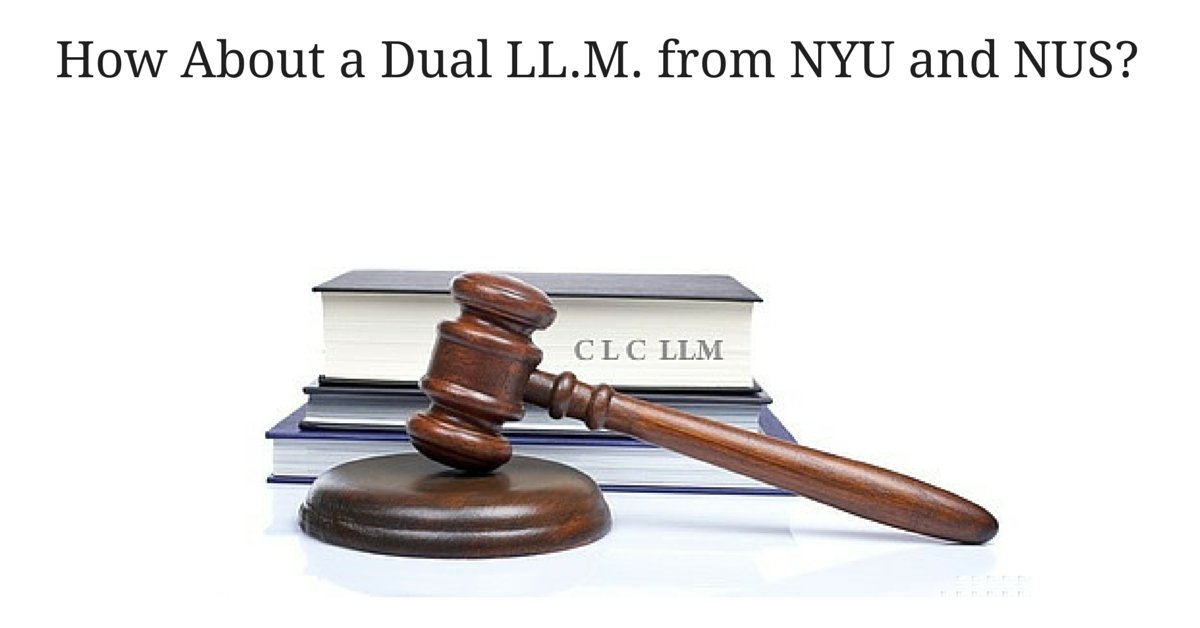This is being republished from A First Taste of Law archives.
Shruti Hiremath, my classmate from NUJS followed up her graduation by an LL.M. that required her to attend two of the world’s best-known universities – New York University and National University of Singapore. Read on for more details.
What was your motivation behind doing LL.M.? When and why did you decide that you need to do master?
I decided to do my masters when I was in my final year. While many are of the opinion that it is best to do an LL.M after getting some work experience under one’s belt, it is my belief that if you are certain about the area in which you want to specialise in, having just graduated should not deter you from applying for a masters (it might, in fact, be beneficial to do so as you get to learn from the experiences of your classmates even before you start on your first job). An in-depth study of my chosen subjects and international exposure were my primary motivations in applying for an LL.M.
How did you choose the university/ college? Where else did you apply? How should one go about choosing a university?
In choosing a university/college, it is very important to focus on whether a given university/college offers the specific courses that you want to do and who the faculty taking those courses are. It is also crucial to think about any other objectives you may have in doing masters. Personally, I was certain I wanted to focus on business laws. Also, I wanted to attend a program with a smaller class size as I think this allows you to interact closely with more people. The NYU@NUS program met these requirements to a tee. Being a dual masters program, I was able to study more subjects in my chosen specialty and the class consisted of only 45 students.
I also applied to the Masters in Law and Finance at Oxford University, but withdrew my application once I received a positive response from NYU@NUS for two reasons: first, I would get greater international exposure, not only in terms of a diverse class but also in terms of giving me the opportunity to experience life in more than one international city (the program allows you to study in three international cities – Singapore, New York and Shanghai); and second, I was offered the Deans’ Award, a merit-based scholarship.
What did you study? Why did you decide to take this particular subject?
I did my LL.M from NYU in global business laws and the LL.M from NUS in corporate and financial services. This is an area that has been of interest to me for very long and since I hoped to work on the transactional side, I decided to take up this field of specialization.
How was your experience? Tell us about the faculty and facilities. Anything memorable that is stuck in your mind?
I had a very enriching experience both within and outside the classroom. The facilities were fantastic both at NYU and at NUS be it academic or otherwise. There was no point where I felt that something was missing. As for the faculty, I couldn’t have asked for better. Both NYU and NUS have renowned faculty and the NYU@NUS program really gives one the best of both worlds – be it Prof.Joseph Weiler (World Trade Law and EU Law), Prof. Franco Ferrari (CISG), Prof. Soornarajah (International Investment Law), Prof. Michal Gal (Competition Law), Prof. Gary Born (International Commercial Arbitration) or Prof. Umakant Varottil (Indian Business Law) to name a few.
I got an opportunity to learn from the best in these fields which I will always cherish. The one thing that really stands out is that most of these professors were not pure academicians but had either practiced law at some point or did so alongside teaching.
This I think is very beneficial for the students as these professors are able to adapt the courses to make them more relevant to actual practice.
How’s the Indian fraternity over there? Are there many Indian students?
On the NYU@NUS program itself we were six Indians. During the NUS terms, we attend classes with NUS students. The NUS program has a very strong representation from India at the LL.M level.
How is the recruitment/ placement situation for overseas students?
Being a dual masters program, students are able to use the career services of both NYU and NUS. The career services organize fairs and also conduct practice interview sessions with various law firms. Students can also attend the International Student Interview Program in New York where many international firms come to recruit.
How was the academic schedule? was there a lot of academic work?
Being dual masters, the academic schedule was hectic. During the NYU terms, we had intensive sessions where we studied only one subject at a time for three weeks at a stretch instead of having one class a week over a semester. I found this system quite effective as it gives one’s study a sense of continuity.
Classes with the NYU professors were extremely interactive. The readings would be allocated/uploaded the previous day and we would have to come prepared to have a discussion on the topic. The NUS terms were like the usual semester system. In addition to classes, we also had to write papers and make presentations.
What about accommodation?
In Singapore, NUS offers a place called College Green to NYU@NUS students. This is 3 bedroom houses that are very close to the campus. I chose to live at a private hostel called Evans Lodge which was also very close to the campus and more reasonably priced. In New York, I lived at D’Agostino Hall which is one of the NYU halls of residence. These are two or three bedroom flats that you share with other students. I shared a flat with another NYU@NUS student and a JD student at NYU.
Tell us about your classmates – was there a predominantly international crowd? What was the general age group of students?
Most students were in their late twenties or early thirties. The crowd was undoubtedly international. Even though we were a class of only 45 students, 23 countries were represented. The diversity was amazing. It gave me a chance to learn about so many different cultures and realize how we are all so different and yet so similar.
Did you get time for any extra-curricular activities?
There’s always time to do anything you want to if you manage your time well! Being dual masters, the program was very hectic. But people did manage to take out time to play sports or get involved in other extra-curricular activities. Personally, I used my time to work as a research assistant for Prof. Umakant Varottil which was a very enriching experience.
How does one go about scholarships? Does the program offer any scholarship?
There are a number of scholarships offered for Indian students going to study abroad such as the ones offered by the Tata endowment, Inlaks Foundation and so on. Each has its own application procedures.
It is important to research their requirements well in advance and keep track of the deadlines. While I did apply for these scholarships and was shortlisted for various interviews, since the program starts earlier than other masters (in May), I was unable to attend any of the scholarship interviews. The program itself does offer various scholarships such as the Deans’ Award, the Singapura scholarship and the David Marshall Scholarship.
What are your future plans? Going forward, how do you expect this experience to influence your career?
I am currently working in London at Allen & Overy. The in-depth knowledge of various business laws and the international exposure gained on the NYU@NUS experience has been extremely beneficial for the cross-border nature of work I am involved in here. Also, the program meets eligibility requirements for taking the New York bar exam. This is an added advantage as it increases one’s mobility and enables one to advise on a broader range of transactions. As for future plans, I plan to continue working in this field.
 Serato DJ Crack 2025Serato DJ PRO Crack
Serato DJ Crack 2025Serato DJ PRO Crack










 Allow notifications
Allow notifications


